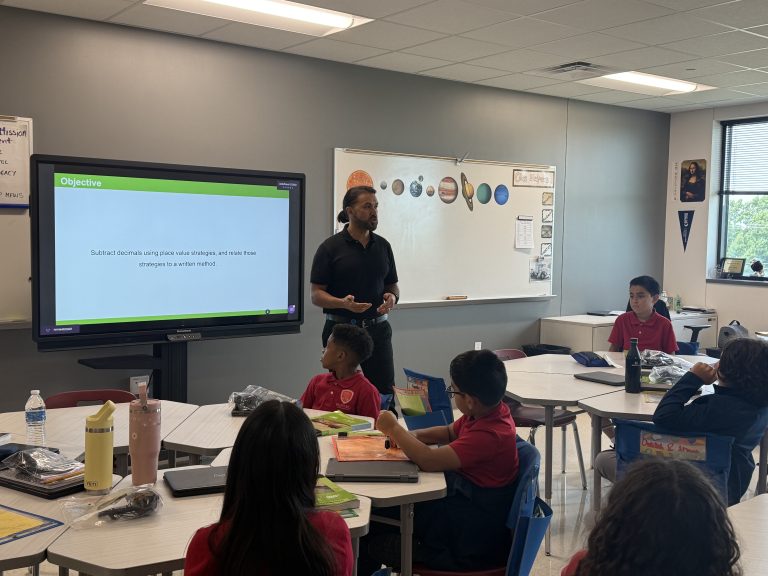At Walnut Hill International Leadership Academy, success is rooted in resilience.
After the school was destroyed by a tornado in 2019, students and teachers relocated to a temporary building. Then came an ice storm and the challenges of the COVID-19 pandemic.
“There was no time to recover or assimilate,” said Jairo Vertal Anagarita, a fifth grade teacher. “But it was a teaching moment for all of us–in real life, things happen, so we wanted to teach the kids to adapt and move on.”
Through every setback, students and teachers adapted, pushed forward, and refused to give up. This led to an extraordinary transformation, with the campus improving three letter grades to earn an A in the 2024–2025 state accountability results.
Philip Meaker, principal, said the school’s STAAR results also stem from prioritizing mental well-being.
“I always encourage my staff to take mental health days, and I tell them family will always come first,” he said. “It trickles down to the teachers, and they do the same for their students.”
Heidi Lingow, a third-grade bilingual teacher, said her teaching philosophy centers on never leaving a student behind.
“We have a big sense of community, and we’re not complete if someone is absent or behind,” she said. “We are going to try to help and encourage them to all grow together. It’s not about having better scores or better grades; we’re trying to grow the student.”
When Meaker arrived in 2022, he focused on growing the middle school, which has since expanded in both students and teachers. Among the new staff is social studies teacher Uriel Diaz.
“The students were low academically in social studies and reading comprehension, so it felt like I needed to do something to bridge what they were missing,” Diaz said.
His efforts helped WHILA earn a state distinction in social studies, one of six distinctions the campus received.
Diaz’s approach was to empower students to take ownership of their work and incorporate reading, writing, and speaking into social studies.
“It was student-centered instead of death by PowerPoint,” he said. “They enjoyed the challenge and wanted to learn.”
Knowing his classes would be a challenge, Diaz conducted one-on-one sessions with each student to understand their progress. A mental health check, they were a way for Diaz to know if he was overdoing it.
Andrew V., an eighth grader, said the one-on-ones with Diaz helped his self-confidence.
“It’s really great to have someone help you if you’re not understanding something,” he said.
Last year, in the middle of testing season, Diaz’s students planned a surprise birthday party for him.
“It showed me I am doing something right. They are going into the world with empathy, self-confidence, and life skills,” he said. “It doesn’t matter what they learned or mastered in class, but the fact they can provide empathy is so remarkable.”
Diaz now leads professional development for teachers to help them see similar results.
His approach is the same as in his classroom: meet the teachers where they are and give them ownership of the process. For professional development days, that means giving teachers the space to teach others about their individual passions and strengths.
With the challenge of maintaining the A-rating, every day is made up of small moments that keep WHILA teachers inspired, knowing they are making a difference in their students’ lives.

